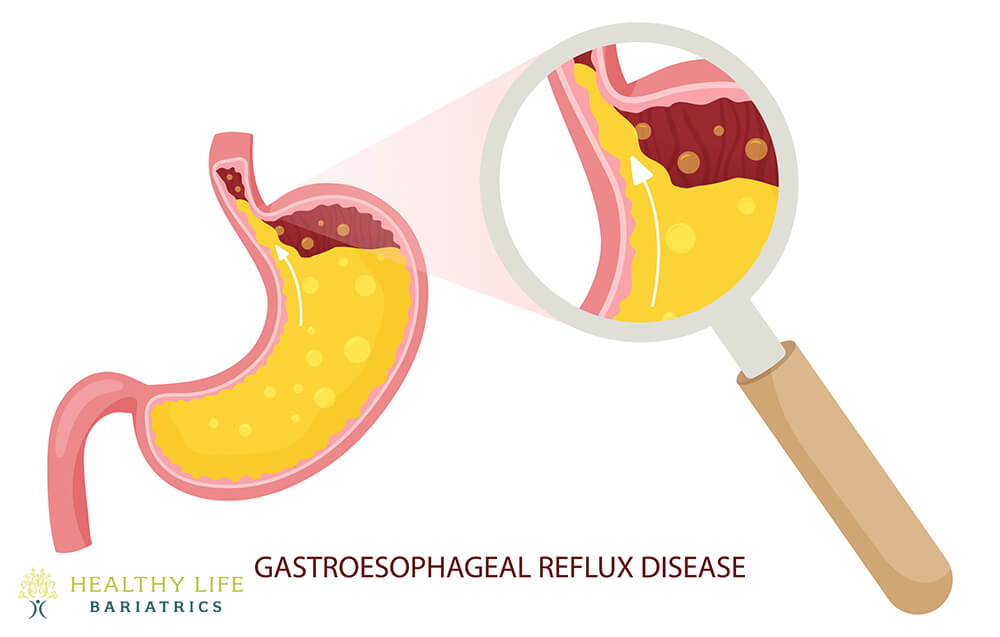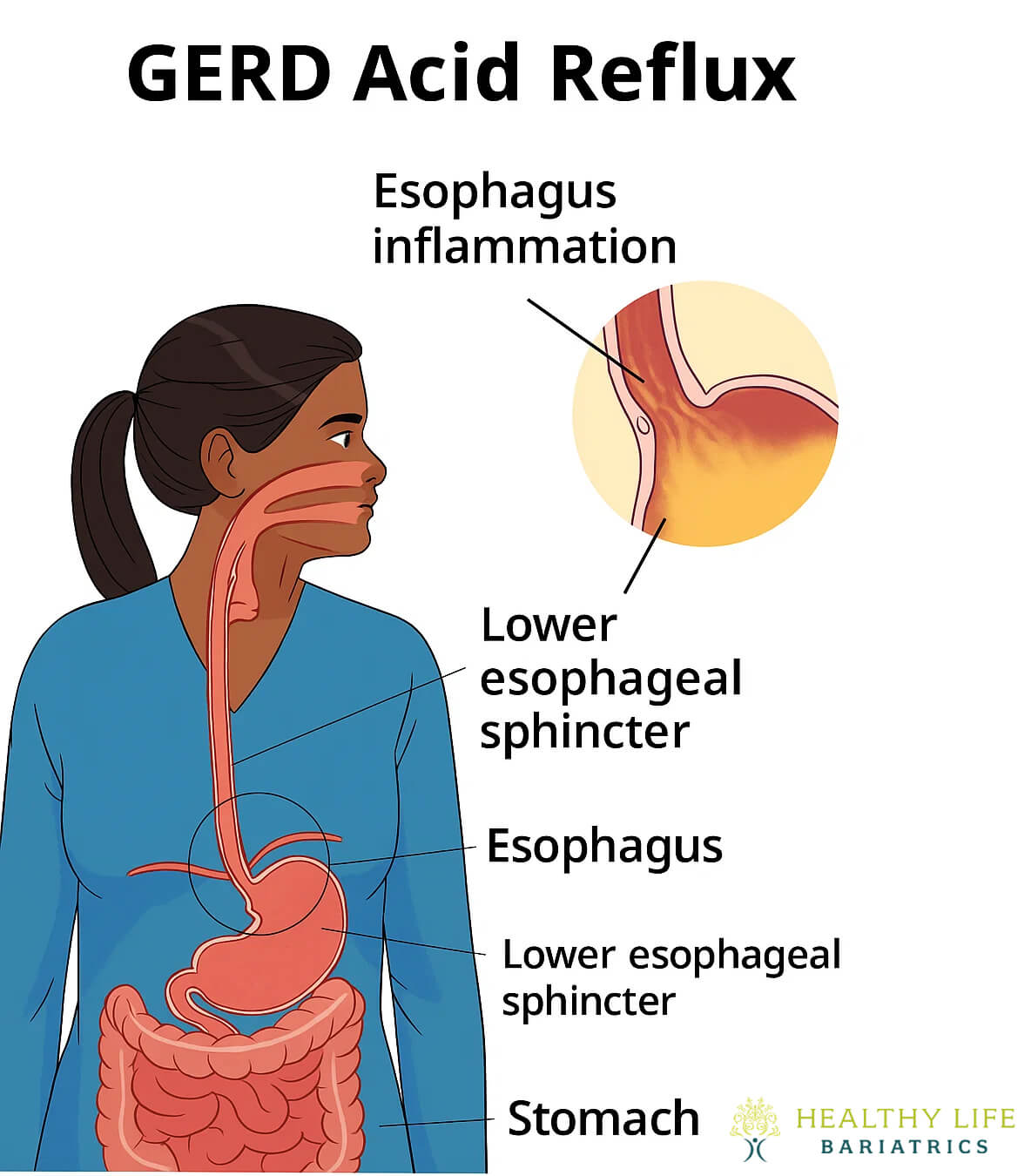Surgery for Gerd
Lifestyle changes and medications can often control gastroesophageal reflux disease (GERD). However, Dr. Moein at Healthy Life Bariatrics may recommend surgery if symptoms like persistent heartburn, chest discomfort, or hoarseness continue, or if tests reveal a hiatal hernia, where part of the stomach pushes through the diaphragm.
GERD occurs when the lower esophageal sphincter (LES)—the valve between the stomach and esophagus—doesn’t function properly. Surgery strengthens this valve to keep it closed, preventing acid and stomach contents from flowing back into the esophagus.

Table of Contents
- Surgery for Gerd
- What Causes Gerd?
- What Lifestyle Changes Can Help Manage Gerd Symptoms?
- When is Surgery Necessary for GERD Treatment?
- How is GERD Surgery Performed?
- Surgery for Gastroesophageal Reflux Disease
- Advancements in GERD Surgery
- What are the Benefits of General Surgery for GERD?
- Ready to Discuss Heartburn GERD Surgery?

What Causes Gerd?
Heartburn occurs when stomach acid flows back up into the esophagus, causing irritation and pain. This happens because the lower esophageal sphincter (LES), a ring of muscle at the bottom of the esophagus, weakens or relaxes and allows acid to reflux upward. Certain foods, obesity, pregnancy, smoking, and some medications can trigger heartburn or make it worse.
In GERD, that valve remains open for longer periods of time and more frequently, allowing a steady stream of acid to damage the esophagus over time. This chronic exposure can cause inflammation (esophagitis), ulcers, scarring, and Barrett’s esophagus (precancerous cell changes). Typical symptoms include burning in the chest or throat, regurgitation, trouble swallowing, and a sour taste.
What Lifestyle Changes Can Help Manage Gerd Symptoms?
The first line of treatment is lifestyle changes like avoiding trigger foods and eating smaller meals, along with over-the-counter antacids. For persistent GERD, stronger prescription medications called proton pump inhibitors (PPIs) block acid production more powerfully. While these strategies control symptoms in most patients, they don’t address the faulty valve itself. So once the medication is stopped, reflux can return. Up to 40% of patients remain symptomatic on optimized drug therapy.
When is Surgery Necessary for GERD Treatment?
Severe, chronic GERD not controlled by medical therapy and endoscopically proven esophageal damage are indications for surgery. Some patients who depend on PPIs for adequate control, but wish to come off long-term medication, may also be candidates. The goals are to reconstruct the malfunctioning valve, prevent further acid exposure, and allow the healing of inflamed tissue. For some patients, surgery can be a cost-effective solution compared to lifelong drugs.
How is GERD Surgery Performed?
Surgery for GERD is usually recommended as a last resort when even prescription medications won't help the heartburn go away.
The most common procedure for GERD correction is fundoplication. This is a procedure that increases the pressure in your lower esophagus. During the surgery, Dr. Moein winds the top portion of your stomach around the LES. This acts as a tightener for the sphincter muscle, allowing it to constrict when it's supposed to. A tighter LES raises the pressure in your lower esophagus, which prevents future instances of reflux. The surgeon performs laparoscopic surgery, which is minimally invasive and involves tiny incisions, small scars, and a short recovery time.
Advancements in GERD Surgery
Endoscopic Procedures:
Advancements in endoscopic techniques offer less invasive alternatives for GERD surgery. Endoscopic suturing and radiofrequency energy application are among the innovative approaches explored in Los Angeles, providing effective options with reduced recovery times.
Robotic Assisted Surgery:
Robotic-assisted surgery is gaining ground in Los Angeles for GERD procedures. Surgeons control a robotic system to perform precise maneuvers, allowing for enhanced accuracy and dexterity in complex surgeries.
What are the Benefits of General Surgery for GERD?
The main benefit of GERD surgery is that you won't experience heartburn or any of the accompanying symptoms like shortness of breath.
Repairing the source of GERD, such as a hiatal hernia, can also help to prevent further complications. Severe complications of GERD can include esophageal ulcers, esophageal stricture (where stomach acid damages your lower esophagus, leading to scar tissue), and lung problems.
Barrett's esophagus can also result, which is where the acid reflux alters the cells that line your esophagus, which can make you more susceptible to esophageal cancer.
Ready to Discuss Heartburn GERD Surgery?
If you have had enough of living with GERD symptoms, surgery can help. Dr. Babak Moeinolmolki and his compassionate surgical team look forward to treating you. If you live in Los Angeles, Encino, or Glendale, California, call today to schedule a consultation with world-class general surgeon Dr. Moeinolmolki who performs heartburn GERD surgery in Los Angeles CA – (310)807-2378.


